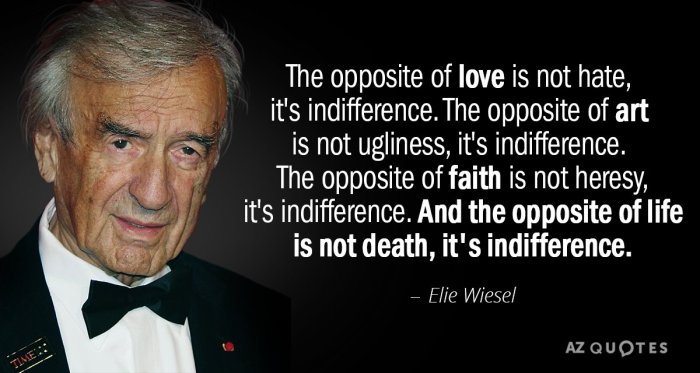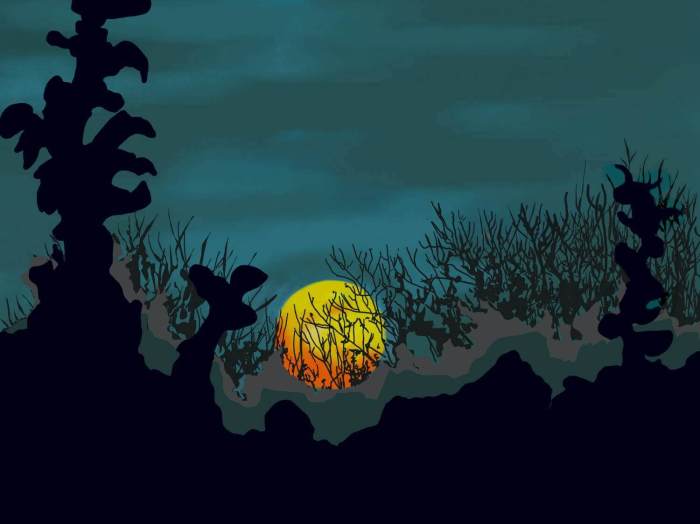Mla citation night elie wiesel – The MLA citation style guide for “Night” by Elie Wiesel provides a comprehensive overview of the specific requirements for citing this powerful Holocaust memoir. Understanding these guidelines ensures accurate and consistent documentation in academic writing.
This guide covers the nuances of in-text citations, works cited entries, and more, empowering researchers and students to effectively reference this seminal work.
MLA Citation Style Guide for “Night” by Elie Wiesel
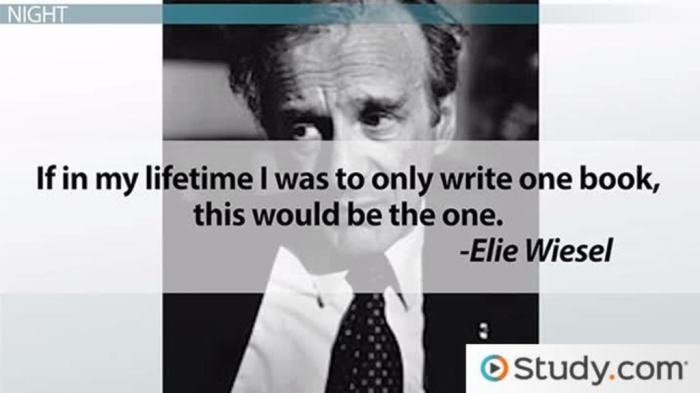
The Modern Language Association (MLA) style is a widely used citation style in the humanities, including literature and language studies. It provides a consistent and standardized way to document sources and avoid plagiarism.
In-Text Citations
In-text citations in MLA style include the author’s last name and the page number from which the quoted or paraphrased material is taken. For example:
(Wiesel 34)
If the author’s name is mentioned in the text, only the page number is included in parentheses:
Wiesel argues that “night” is a metaphor for the Holocaust (34).
Works Cited Entry
The works cited entry for “Night” by Elie Wiesel in MLA style is as follows:
Wiesel, Elie. Night. Translated by Marion Wiesel. Hill and Wang, 2006.
Literary Analysis of “Night” by Elie Wiesel

Elie Wiesel’s “Night” is a harrowing and unforgettable account of the Holocaust. The novel explores the themes of faith, identity, and the nature of evil through the eyes of a young boy named Eliezer. Wiesel uses a variety of literary devices to create a vivid and emotionally resonant narrative.
Main Themes
- Loss of Faith:Eliezer’s faith in God is shattered by the horrors he witnesses in the concentration camps.
- Loss of Identity:Eliezer is stripped of his name, his possessions, and his humanity by the Nazis.
- The Nature of Evil:Wiesel explores the depths of human cruelty and the ways in which evil can triumph over good.
Literary Devices
- Symbolism:Wiesel uses symbols throughout the novel to represent the horrors of the Holocaust, such as the fire, the night, and the train.
- Imagery:Wiesel’s vivid and graphic imagery creates a visceral experience for the reader, immersing them in the horrors of the concentration camps.
- Metaphor:Wiesel uses metaphors to compare the experiences of the Holocaust to other events, such as the crucifixion of Christ.
Character Development
Eliezer undergoes a profound transformation throughout the novel. He begins as a naive and innocent boy, but by the end, he has become a hardened and cynical survivor. Wiesel’s depiction of Eliezer’s character development is both heartbreaking and inspiring.
For MLA citation night, Elie Wiesel’s works are a must-read. His powerful prose has resonated with generations. While exploring Wiesel’s poignant words, let’s take a moment to appreciate the beauty of nature with the goldenrod is yellow poem . Its vivid imagery reminds us of the resilience found both in nature and in Wiesel’s message of hope amidst adversity.
Historical Context
“Night” is a powerful reminder of the horrors of the Holocaust. Wiesel’s novel helps us to understand the human cost of war and the importance of fighting against tyranny.
Historical Significance of “Night” by Elie Wiesel: Mla Citation Night Elie Wiesel
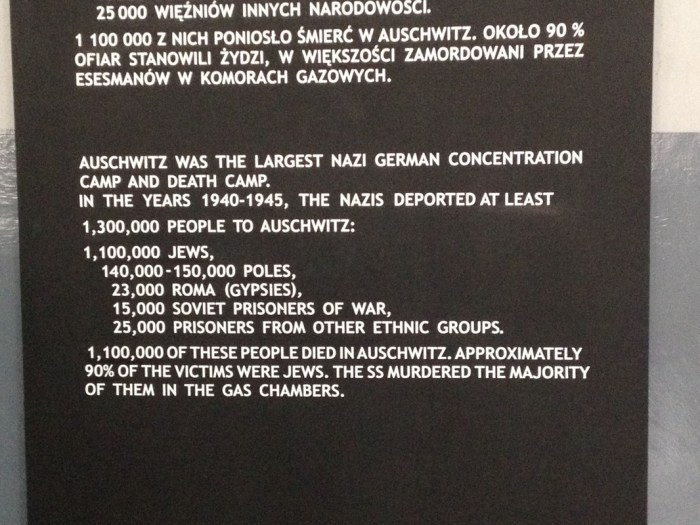
Elie Wiesel’s “Night” holds immense historical significance as a Holocaust memoir. It serves as a poignant and harrowing account of the horrors endured by millions during the Holocaust.
The novel has profoundly impacted Holocaust education and awareness. It has been translated into more than 30 languages and has become a staple in Holocaust literature. Its vivid descriptions and raw emotions provide a visceral understanding of the atrocities committed during this dark period in history.
Elie Wiesel as a Holocaust Survivor and Advocate
As a Holocaust survivor, Elie Wiesel dedicated his life to ensuring the memory of the Holocaust would never be forgotten. He became a renowned advocate for human rights and a tireless voice for the voiceless. Through his writing, speeches, and humanitarian efforts, Wiesel played a pivotal role in shaping public understanding of the Holocaust and its lasting impact.
Cultural Impact of “Night” by Elie Wiesel
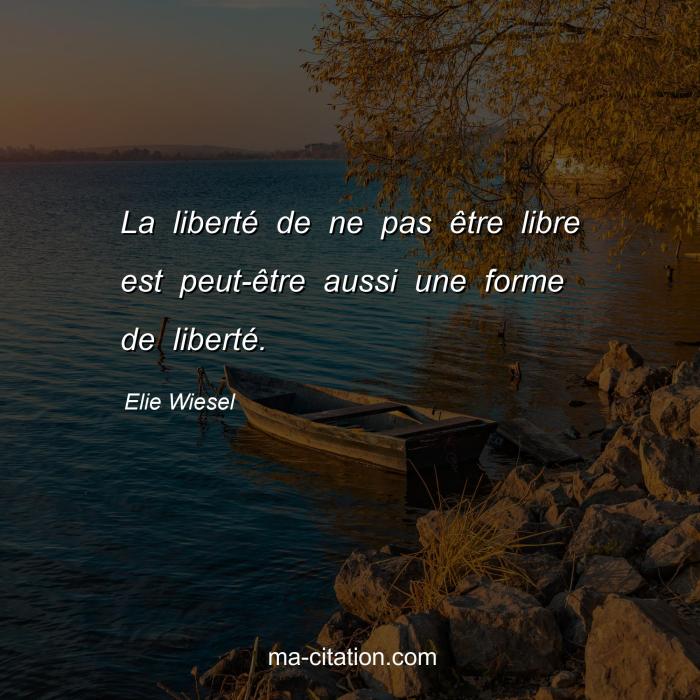
Elie Wiesel’s “Night” has had a profound impact on literature, film, and other art forms, shaping our understanding of the Holocaust and its lasting legacy.
Influence on Literature
The novel’s unflinching depiction of the horrors of the concentration camps has influenced countless writers, inspiring works that explore the themes of trauma, survival, and the human capacity for both good and evil.
Influence on Film
“Night” has been adapted into several acclaimed films, including the 1960 film “Night and Fog” and the 1985 film “Night.” These films have brought the novel’s message to a wider audience, raising awareness of the Holocaust and its devastating impact.
Influence on Popular Culture, Mla citation night elie wiesel
The novel has also influenced popular culture, inspiring songs, documentaries, and other artistic works that have helped to keep the memory of the Holocaust alive.
Shaping Our Understanding of the Holocaust
“Night” has played a crucial role in shaping our understanding of the Holocaust. Its raw and unflinching portrayal of the atrocities committed has helped to educate generations about the horrors of genocide and the importance of remembering the victims.
General Inquiries
How do I cite “Night” by Elie Wiesel in MLA format?
Use the following format for in-text citations: (Wiesel page number). For the works cited entry, use the following format: Wiesel, Elie. Night. Translated by Marion Wiesel. Hill and Wang, 2006.
What are the key themes explored in “Night”?
The novel explores themes of faith, identity, suffering, and the Holocaust.
Why is “Night” considered a significant work of literature?
As a Holocaust memoir, “Night” provides a firsthand account of the horrors of the Holocaust and its impact on the human psyche.
